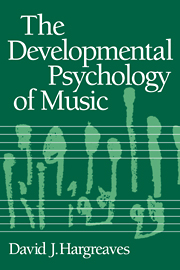Book contents
- Frontmatter
- Contents
- Preface
- 1 The developmental psychology of music
- 2 Children's thinking and musical development
- 3 Musical development in the preschooler
- 4 Musical development in the schoolchild
- 5 Development of responses to music
- 6 Creativity, personality, and musical development
- 7 Social psychology and musical development
- 8 Developmental psychology and music education
- References
- Author Index
- Subject Index
6 - Creativity, personality, and musical development
Published online by Cambridge University Press: 27 August 2009
- Frontmatter
- Contents
- Preface
- 1 The developmental psychology of music
- 2 Children's thinking and musical development
- 3 Musical development in the preschooler
- 4 Musical development in the schoolchild
- 5 Development of responses to music
- 6 Creativity, personality, and musical development
- 7 Social psychology and musical development
- 8 Developmental psychology and music education
- References
- Author Index
- Subject Index
Summary
Creativity is one of the most complex, mysterious, and fascinating aspects of human behaviour. It has attracted the attention of philosophers, artists, historians, and other thinkers for many years, and its complexity presents difficult, if not intractable problems to the experimental psychologist. Nevertheless, psychological studies of creativity have proliferated in recent years. A clear landmark was J.P. Guilford's Presidential Address to the American Psychological Association in 1950 on ‘Creativity’. A wealth of research has been carried out since then; the Journal of Creative Behavior was established in 1967, and is still flourishing. Early signs that the empirical study of creativity represented a ‘bandwagon’ or ‘cult’ topic, which would become yet another educational fad, were not borne out. Instead, as Freeman, Butcher and Christie (1971) pointed out, ‘It is now accepted in erudite and conservative circles: a review of the appropriate major learned journals and abstracts in education and psychology shows that a significant number of sub-sections have been established under the general heading “creativity”’ (p. 74). Two of the twelve subscales of the British ability scales (Elliott, Murray and Pearson, 1978) are designed to assess different creative abilities, which is an indication of the way in which the topic has been assimilated into the mainstream of psychology.
- Type
- Chapter
- Information
- The Developmental Psychology of Music , pp. 143 - 178Publisher: Cambridge University PressPrint publication year: 1986

